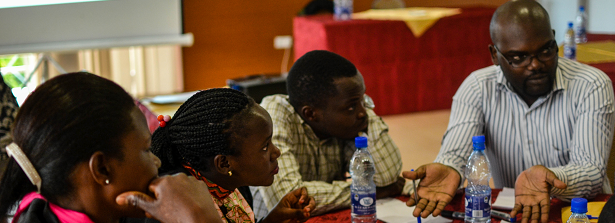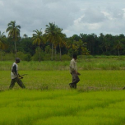Sugar and forestry investments in Uganda: lessons from a first Learning Platform in Jinja

After two Learning Platforms in Tanzania and Mozambique, LANDac and partners organized their third multi-stakeholder learning event in Jinja, Uganda on September 21 and 22, 2017. The platform in Jinja focused on two major investments in the region: one in agriculture (sugar) and one in forestry (pine trees and eucalyptus), and brought together representatives from those investments, local and national government officials, civil society organizations and representatives from six local communities living within the investment areas. This blogpost shares some of the main findings from the preparatory local research in August and September, and main discussions during the two-day learning event.
The Learning Platforms in Tanzania, Mozambique and Uganda create space for dialogue and learning around land-based investments in agriculture and forestry. The platforms focus on how to better align land-based investments with local development priorities. Each two-day platform meeting is preceded by research in communities in the investment areas, and followed by monitoring meetings and continued engagement. The project is initiated by LANDac, together with CIFOR, the Food & Business Knowledge Platform (F&BKP), and implemented by Shared Value Foundation (SVF).
The location: Jinja, Uganda
Jinja is a small town in Uganda, and located approximately 80 kilometres from the capital Kampala. Jinja is a town of almost 80,000 inhabitants (2014 census), but is of significant importance for economic activities in the region. Several larger and smaller land-based investments are located in the area, and the Kampala-Jinja corridor is part of the East Africa Northern Corridor. This corridor links South Sudan, Rwanda, Burundi, the Eastern part of the DRC and Uganda to the Mombasa port in Kenya at the shores of the Indian Ocean. The road between the two cities is the busiest road in Uganda, and the surrounding districts of Kampala, Wakiso, Mukono, Buikwe, Jinja and Mayuge have hosted large-scale investments for decades because of their fertile soils and strategic location, including the proximity to the capital. The area currently hosts several large plantations and estates and has been supplying the country with large quantities of produce including coffee, tea, sugar, fruit and vegetables.
The investments: sugar and timber
Two major investments in the districts of Jinja and Mayuge participated in the preparatory local research and multi-stakeholder event: Kakira Sugar Works (KSW) and Busoga Forestry Company (BFC). Kakira Sugar Works is part of the Madhvani Group of companies, an influential and long-established investment in the region and provides jobs for about 7,500 individuals in the area, in addition to sourcing sugarcane from around 7,000 smallholder sugarcane producers. Busoga Forestry Company is a subsidiary of the Norwegian forestry investment Green Resources and manages close to 6,000 hectares of pine tree and eucalyptus plantations in Mayuge district. Both companies were visited multiple times prior to the platform, they provided information for selecting the research locations, and participated actively in the two-day Learning Platform with other stakeholders in September.
The research: contributions and restrictions to local development
The research showed diverse outcomes for both investments, reflecting the history and different models of the investments. For Kakira, a sugar company that has been working in the area for a long time, and who actively works with smallholder farmers, the research showed recognition of the company’s contribution to development in the area. Almost all sugarcane farmers stressed the huge positive impact of the establishment of a number of competing sugar factories in the same area. This has greatly increased prices paid for raw sugarcane in the area: respondents reported that prices have multiplied five times since the establishment of other companies. Some negative consequences of the establishment of new sugar processing companies were also voiced, including an increase in bad smells coming from the factories and reduced Corporate Social Responsibility activities (e.g. clearing of roads) and provision of extension services from Kakira around areas close to the new companies.
BFC, on the other hand, has a different relationship with the communities in their plantations. There is no direct, active engagement of local producers as suppliers of timber, and – most importantly – the company doesn’t officially recognize the people living in the area. This means people are only allowed to live in mud houses, and cannot build permanent structures. Main issues around the plantations include a severe sense of land access insecurity and limited CSR activities. People stressed that when the company started out, local population used to co-exist with the company and practiced grazing and intercropping between young trees on the plantation. Most complaints from respondents were related to the stricter rules and regulation the company has started to employ, as well as the increasing pressure on land. Following their original agreement with the Government of Uganda, the company is trying to get the complete 9,000 ha of the Bukaleba Central Forest Reserve under coverage of trees, which basically leaves no area for the current population for settlement nor cultivation.
The discussions: alternative livelihoods and increased understanding across stakeholders
The platform meeting in Jinja was attended by 23 participants from private companies, communities surrounding the investments, civil society organizations with projects in the area, researchers, and government officials from the two districts. The programme was spread across two days. On day one, stakeholders identified four priority issues to further work on: inadequate communication and transparency, social-economic topics (with a focus on education), land issues (unclarity of boundaries and conflict around land use) and limited community involvement and participation.
The action: follow-up activity plans
Following the discussions on the first day, and building on the priority issues identified on the second day, three groups were formed, each containing representatives from each sector? The groups worked jointly on concrete ideas for addressing some of the challenges existing in communities. A first group worked on issues of education. They proposed to work towards better education services through creating community-based organizations of parents, who are interested in improving education. Through those groups, they can lobby with both companies to work on this. A second group worked specifically on land issues around BFC. They proposed a number of activities to find alternative livelihood activities so that dependency on land resources can be reduced; while also improving public relations between BFC and the communities (focusing on local employment, CSR spending according to community priorities, and increased sensitization of stakeholders). A final group worked on ways to increase community engagement and partnerships. Their main ideas centred on the establishment of a round table of stakeholders and activities focusing on training and capacity building (also contributing to increased exchange between stakeholders, with attention for two-way communication).
Participants of the platform finalized the meeting by agreeing on a number of first steps to be taken by several platform participants. These steps ranged from Kakira Sugar and the Jinja NGO Forum taking the lead on setting up a round table of stakeholders; to the initiative of Rehema, a resident of one of the villages, to make a first list of parents interested in lobbying for quality education.
This blogpost presents some of the main topics for discussion and outcomes of the meeting, however, if you are interested in more detailed information, please contact the organizers of the platform: and . Early 2018, a synthesis report will be published, presenting overall findings and outcomes of the Learning Platforms.
_ _ _
In the coming weeks, the team will re-visit Jinja and Mayuge districts to conduct follow-up focus group discussions in the different communities – which are organized in close collaboration with the community members who have joined the Learning Platform.






